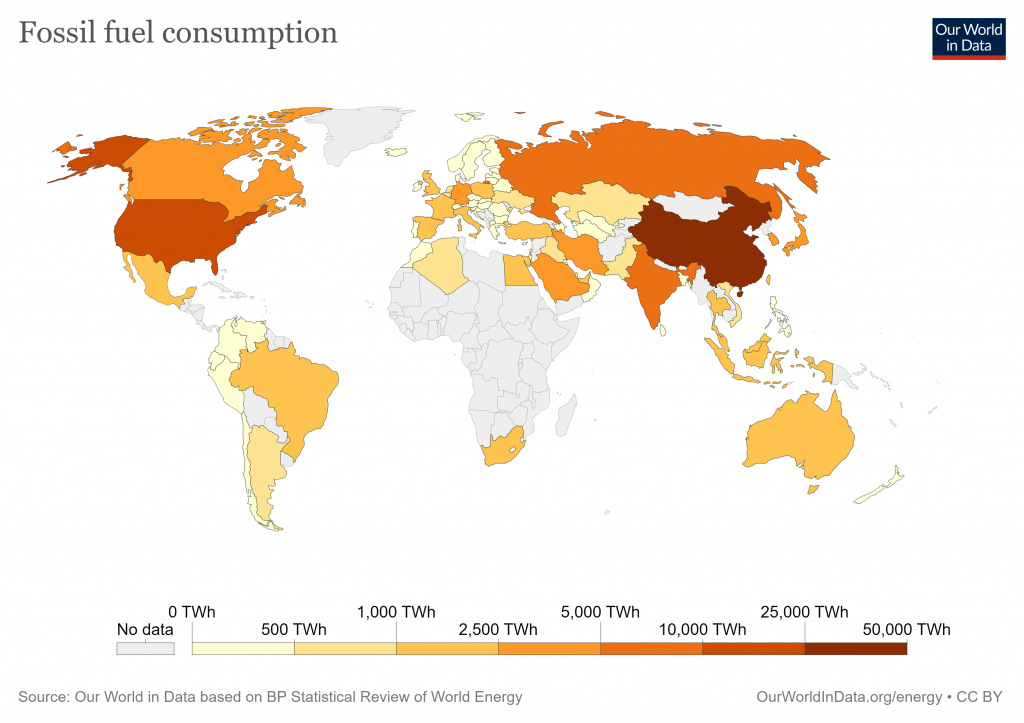
Yesterday I ordered food from Zomato. It was good, even though I didn’t know where the food was coming from. I mean I didn’t know who produced the rice, vegetables or lentils. Even if I didn’t grow the food needed to sustain myself, I was able to buy it because I had money. What could make an end to that? What could prevent me from buying food like that? If crops can not be cultivated for the entire population, it could lead to a global famine. In such a case, I wouldn’t able to just buy food with any amount of money I have. What could possibly lead us to such a crisis? One good candidate is Global Climate Change.
Our one and only planet 🌍 is warming up. Who’s to blame? Humans. When the industrialization started and the use of coal became common in the 1880s, we knew little about our environment. If you said that we could warm the planet by literally burning stuff, you would have been laughed at by everyone. I mean come on, the Earth is such a large planet. How could a few humans burning coal cause the planet to warm up, they would’ve thought. But after a 100+ years later we now realize that it was indeed possible to cook the planet. What’s bad about it? Well, we’re inside that oven, cooking ourselves 🥘.
Should we be worried about climate change? When we can buy enough food everyday, when we have jobs that earn us money to afford anything we need, when we are safe in our home shelters, when we have automobiles to travel everywhere, when we have hospitals and medicines even if we fall sick, why should we be worried about climate change? Is this climate change real, anyway?
While majority of the human population is ignorant/unaware of the consequences of global climate change, the effects are apparent everywhere and in everything. The first image you saw is such an indicator. Each colored vertical stripe is the average yearly temperature of the globe. The graphics is called “warming stripes” and is created by Prof. Ed Hawkins, climate scientist at University of Reading, UK. The purpose of the graphics is to convince the reality of global climate change in terms of rise in temperature, to people with less scientific understanding. Even for the educated population, it is still difficult to decipher the huge amount of data collected and research done on climate change, and independently infer the effects of it. This is why people like Ed Hawkins tries to communicate to us the risks and challenges involved with climate change.
It will be obvious to you by looking at the graphics, how much it has changed. You don’t need to know the exact temperature values, but observing the shift in color from dark blue to deep red is enough. Below graph is for my state, Kerala.

Are we humans really causing this? Well, yes. As of 2018, the energy to run the modern world comes from 34% Petroleum, 27% Coal and 24% Natural gas. That amounts to 85%. The remaining comes from Nuclear, Hydroelectric and other renewable sources. Burning fossil fuel releases large amounts of CO2 and other harmful gases. This is because fossil fuel consists of various Hydro-Carbons. When the HC react with Oxygen, they release energy and many byproducts. This is unlike burning anything else, like wood.
Annual Global CO2 Emission from Fossil Fuels
That’s huge!
Numbers associated with Earth are usually large. But in the case of CO2, only a small percentage of it is being recycled by our environment. This leads to a net increase of CO2 in the atmosphere. We have been doing this for a long time now. CO2 is a greenhouse gas. It traps Sun’s thermal radiation inside our atmosphere. Normally, this is automatically regulated by Earth. But there’s a limit to anything and everything. When we reach that limit, a catastrophic fail happens. Such an event introduces chaos, causing everything to reset, so that something fresh can start. We are getting closer and closer to such an event. See how much each country is contributing to this.



So what does a change in temperature mean? Hot summers? 🌞 Can’t we just turn up the AC and fans in that case? Not so. The effects of human caused climate change is not immediate, but gradual and long term. This is the reason why it was not a concern when we started using fossil fuels to build the modern world. Ignorance from delayed consequences is a behavior of humans (cigarette smoking for example). This is mainly because we never evolved to deal with anything occurring on such large timespans. But being intelligent beings, not showing concern indicates the lack of intelligent thinking and foresight.
Effects of Climate Change
Let’s look at some of the most terrifying effects of global climate change has in the environment. We should also know that impacts made to the environment also affect our lives, like the food we eat.
1. Melting of ice and rising mean sea levels.
If you live in areas where elevation is lower, such as closer to the sea, you should be worried. Rising sea level will flood more and more land and cause mass relocations. It is difficult to predict anything about climate, such as how much the sea will rise in the future. But many studies give a worst case figure of 2 to 3 meters by the end of this century. The amount of water locked up in ice is only 1.7% of the water mass of Earth. But if this ice completely melted, the sea level will rise to 70 meters (Kerala will completely disappear under water).
2. Melting of Permafrost and the release of excess amount of greenhouse gases
Permafrost is not just ice. It ice, soil and organic materials that remain frozen (harder than concrete) for a long time. Rising atmospheric temperature will cause these to thaw and expose the organic materials to the environment. Microbes decomposing these organic material will release large amounts of CO2 and Methane, both greenhouse gases. Moreover, the organic material will also contain ancient pathogens that can make existing life forms very sick. That includes us.
3. Declining marine life and its diversity.
This means fish for most of us. But it includes all aquatic life-forms such as algae and planktons that produces half of atmospheric Oxygen. Marine ecosystem is extremely sensitive to change in climate. Rise in atmospheric temperature will cause the ocean to heat up. Not only that, but oceans do absorb the CO2 and turn more acidic in nature. This effect is called ocean acidification. All these changes make it difficult for most marine life to survive.
4. Extreme weather
Ever wondered why severe floods and storms are getting more frequent? Take Kerala for example. We have seen more cyclones hitting Kerala in the last 10 years, than the decade before it. There were 43 cyclonic storms hitting India in 2010s, compared to 39 in 2000s. Not only their numbers have increased, but severity also has risen. Intense rainfall will cause flat planes to get flooded, and landslides to occur along mountainous ranges such as Idukki district of Kerala. Thanks to climate change, what once was rare, is now more frequent.
5. Famine
Climate change can alter known weather patterns on which agriculture is depended on. This will decline food production and increase the cost of food. Agriculture contributes around 15.4% to India’s GDP. We produce enough food to feed our 1.3+ Billion population (but unfortunately we waste 30-40% of it). But this could change in the future. It is expected that rise in temperature will make more new places favorable for agriculture, but currently favorable places like India will struggle.
Climate change can also give rise to new diseases that affect our crops. Remember the scenes from Interstellar? In that, it is shown that a type of fungal disease called Blight affects the crops, bringing an extreme global famine and make the planet unsurvivable to us. Something like that could happen anytime.
6. Pandemics
Increasing temperature can cause more and more pathogens (bacteria, virus and fungi) to evolve to survive in higher temperatures. We get chills 🥶 from high temperatures when we have fever right? Thanks to millions of years of evolution, our body has learned to increase body temperature to fight pathogens when they enter our blood stream. Why this is because, most bacteria and fungi can’t survive at high temperatures. But may not anymore. We are helping all pathogens to circumvent body’s defenses by exposing them to higher temperatures. Pathogens reproduce and evolve really fast. Every time they produce new generations, errors in their genetic material help them evolve new capabilities. These new features not only help them to survive and thrive in a previously unsurvivable condition, but also make more organisms sick.
This is because while pathogens can evolve faster, complex organisms such as humans can’t. It leaves our immune systems prone to more diseases. This means, we are expected to encounter more and more deadly pandemics in the future caused by bacteria, virus and fungus. But what about modern medicine? Can’t it help us? Modern medicine helps our body to defeat diseases that it normally can’t. That means we are impeding the process of natural evolution using medicines, by not allowing our body to learn and evolve. More and more of our antibiotics and medicines will stop working against highly evolved pathogens. Such organisms are called superbugs.
If you think we can just create new medicines against the new pathogens, you will be disappointed. We have not developed and approved new antibiotics in the last 25 years. Climate change will reduce our chances of developing new ones since the pathogens are evolving faster. Antimicrobial resistance will become a global health challenge in the coming decades.
These are some of the known and predictable outcomes of climate change. There may be things that we would not expect or be aware of at the moment. COVID-19 was unexpected right? We were not prepared. Something like that may not be far in time. But nature is really smart. It may be slow to react, but it will adapt to anything. It can recover from anything. Evolution is the finest art nature has been mastering since the beginning of time. And look, one of that outcome is typing this shit out! Climate change? Just give nature a few 1000s of years and it will recover [without us]. Plastic? Nature will break down all plastics. Cost? A few 1000s of years.
So it is us that is stupid. We are damaging the only planet we have, and not planning to stop it anytime soon. We are digging graves for our future generations by slowly making Earth inhabitable to ourselves. A small portion of the human society actually understands the seriousness of climate change. These include some of the most powerful people in the world. A very small portion thinks climate change is nothing but a fallacy. But the actual problem is, majority don’t care. They are either ignorant or unaware of climate change, because there’s nothing immediate to cause a concern. They are more worried about getting job, settling down and so on. And they can not be blamed for that.
So how many of you’re worried about climate change?





Very informative !👏
😇🙏